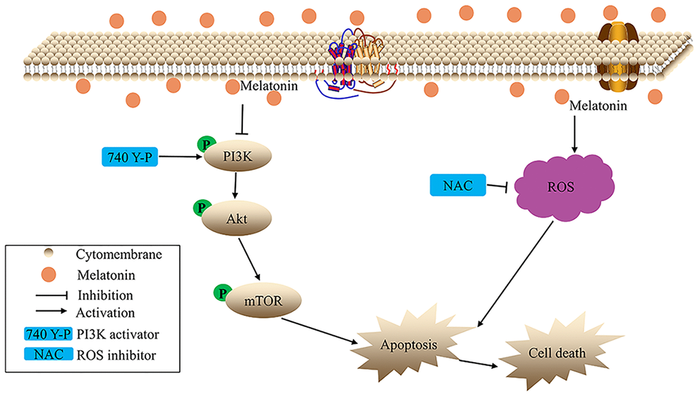Aging-US published “Melatonin inhibits proliferation, migration, and invasion by inducing ROS-mediated apoptosis via suppression of the PI3K/Akt/mTOR signaling pathway in gallbladder cancer cells” which reported that melatonin is an indolic compound mainly secreted by the pineal gland and plays a vital role in the regulation of circadian rhythms and cancer therapy.

Credit: Correspondence to: Xiao-Jing Shi email: [email protected] and Wenlong Zhai email: [email protected]
Aging-US published “Melatonin inhibits proliferation, migration, and invasion by inducing ROS-mediated apoptosis via suppression of the PI3K/Akt/mTOR signaling pathway in gallbladder cancer cells” which reported that melatonin is an indolic compound mainly secreted by the pineal gland and plays a vital role in the regulation of circadian rhythms and cancer therapy.
However, the effects of melatonin in gallbladder cancer and the related mechanism remain unknown. The results showed that melatonin inhibited growth, migration, and invasion of gallbladder cancer cells. Subsequently, the assays suggested that melatonin significantly induced apoptosis in gallbladder cancer cells and altered the expression of the apoptotic proteins, including Bax, Bcl-2, cytochrome C, cleaved caspase-3, and PARP.
Treatment with N-acetyl-L-cysteine or 740 Y-P remarkably attenuated the antitumor effects of melatonin in NOZ and GBC-SD cells. Finally, melatonin suppressed the growth of GBC-SD cells in an athymic nude mice xenograft model in vivo.
Dr. Xiao-Jing Shi and Dr. Wenlong Zhai said, “Gallbladder cancer is reported to be the most aggressive and common pathological type of biliary tract cancer word widely.”
Unfortunately, the majority of gallbladder cancer patients are diagnosed when they are at advanced stages, since patients present with metastasis and other symptoms at a late stage.
Previous studies report that the 5-year survival rate for GBC is 13%, and the median survival time is below 1 year. Therefore, novel drugs and therapeutic targets for inoperable patients with GBC are urgently needed.
The synthesis and secretion of melatonin are controlled by the light/night clock, meaning that light suppresses melatonin synthesis while darkness stimulates its production. After hydroxylation and decarboxylation, tryptophan synthesizes serotonin and this process is regulated by tryptophan hydroxylase and decarboxylase. Serotonin is then acetylated, methylated, and converted to melatonin in the pineal gland.
Recently, accumulating evidence has revealed that melatonin suppresses tumorigenesis, metastasis, and drug resistance in multiple cancers. By reducing the expression of iNOS and COX-2, melatonin restricts inflammatory damaging effects, thus inhibiting tumor progression in breast cancer. Melatonin disrupts the tumor blood vessel formation in renal adenocarcinoma by decreasing VEGF. The relationship between melatonin and gallbladder cancer has however not been clearly established.
These authors evaluated the inhibitory effects of melatonin on gallbladder cancer cell proliferation.
The Shi/Zhai Research Team concluded in their Aging-US Research Output, “the present study demonstrates that melatonin suppresses proliferation, migration, as well as invasion of gallbladder cancer cells. Mechanistically, in vitro, melatonin promoted ROS-mediated apoptosis of gallbladder cancer cells. Further studies suggest that melatonin suppresses the phosphorylation of the PI3K/Akt/mTOR signaling pathway (Figure 7). Moreover, melatonin also inhibits tumor growth in vivo without obvious toxicity. Overall, melatonin may be an effective and novel candidate for the treatment of gallbladder cancer.”
Full Text – https://www.aging-us.com/article/203561/text
Correspondence to: Xiao-Jing Shi email: [email protected] and Wenlong Zhai email: [email protected]
Keywords: melatonin, apoptosis, PI3K/Akt, ROS, gallbladder cancer
About Aging-US
Launched in 2009, Aging-US publishes papers of general interest and biological significance in all fields of aging research as well as topics beyond traditional gerontology, including, but not limited to, cellular and molecular biology, human age-related diseases, pathology in model organisms, cancer, signal transduction pathways (e.g., p53, sirtuins, and PI-3K/AKT/mTOR among others), and approaches to modulating these signaling pathways.
To learn more about Aging-US, please visit http://www.Aging-US.com or connect with @AgingJrnl
Aging-US is published by Impact Journals, LLC please visit http://www.ImpactJournals.com or connect with @ImpactJrnls
Media Contact
18009220957×105
[email protected]
Copyright © 2021 Impact Journals, LLC
Impact Journals is a registered trademark of Impact Journals, LLC
Journal
Aging-US
DOI
10.18632/aging.203561
Article Title
“Melatonin inhibits proliferation, migration, and invasion by inducing ROS-mediated apoptosis via suppression of the PI3K/Akt/mTOR signaling pathway in gallbladder cancer cells”



